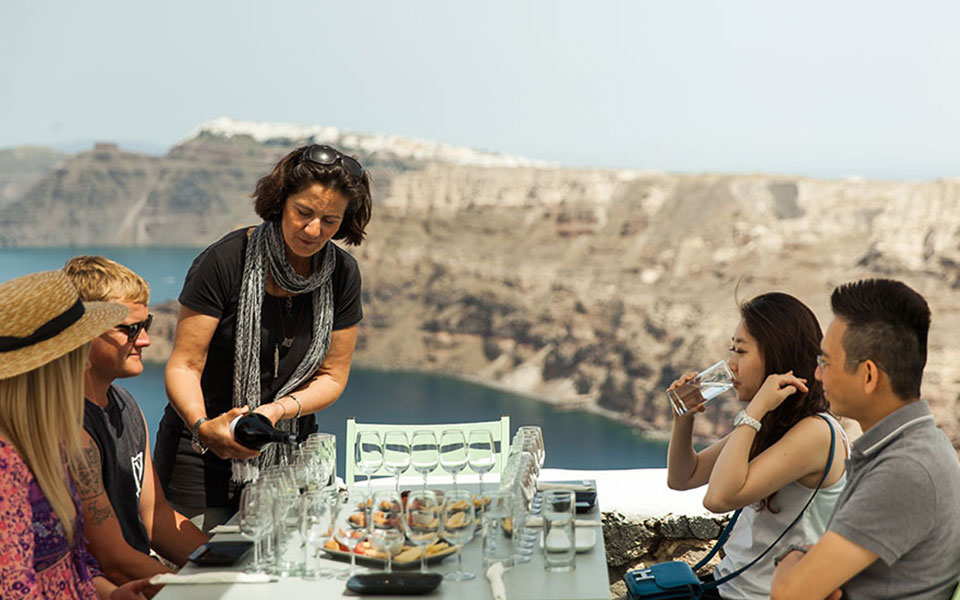While the unique and popular cuisine of Greece has always been one of the reasons that people vacation here, organized food tourism is now another reason to come. Guesthouses, farms, wineries and many other places producing traditional food invite guests to watch the process, and take part in the production.
You can learn how to cook fish to perfection on the islands, hunt for and enjoy some of the country’s delicious mushrooms in the forests of central Greece, or enjoy tastings of wine and olive oil in picture-perfect vineyards and olive groves. There is literally a destination for every taste.
Below are some of our favorites:
Wine Lovers: Santorini Wine Trails
Like wreaths strewn over the naked ground, the vines of Santorini’s vineyards grow in rings called koulouria. When you step closer, you’ll notice that the grapes grow on the inside of these basket-like rings, where, for part of the day, they’re protected from the island’s harsh sun. Wine has been grown using this unique cultivation method on Santorini since ancient times, and the local vintners make a point of only producing wines that are native to the volcanic soil of the island.
Whether or not you’re a knowledgeable enophile, or visiting a vineyard for the first time, a wine tour on Santorini is an unforgettable experience. Iliana Sidiropoulou, who runs Santorini Wine Trails, says that “Greek wines have become almost synonymous with Santorinian wines internationally, so this is an excellent place to start exploring.” She is talking about the crown jewel of Greek wines –Assyrtiko, which is the focus of her tours on the island. It’s a wine that is best enjoyed with food, so you can expect nibbles along the way.
Info
Sidiropoulou organizes tours in English and French. The Santorini Wine Lover tour (120 euros/person) includes a guided tour of one vineyard and three different wineries, and a tasting of the Santorini wine types. On the Santorini Foodie tour (125 euros/person), visits to one vineyard and two wineries are followed by trips to a microbrewery and a farm, where you’ll sample plenty of local delicacies.
Emboreio, Santorini, Tel (+30) 22860.831.03, (+30) 697.900.0568, santoriniwinetrails.gr
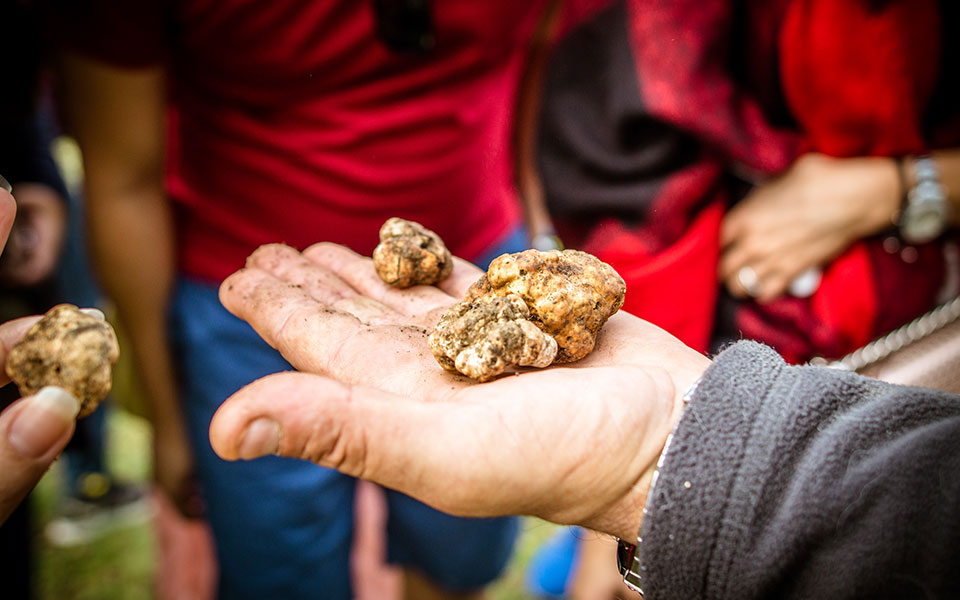
© Natural History Museum of Meteora & Mushroom Museum
Truffle Hunting: Mushroom Museum, Meteora
Every fourth Sunday at 10:00, truffle hunter Panagiotis Varipatis and his trusted labradors, Maya and Dorita, guide visitors into the forest near the village of Kalabaka. Below the towering rocks of Meteora, the dogs scour every corner of the woods, skillfully and carefully digging up their precious finds. The truffle hunt is organized by the Natural History Museum of Meteora & Mushroom Museum, one of the few mushroom museums in Europe.
Meteora may be the most fairytale-like destination in Greece, with the monasteries on top of the pillars of rock recalling scenes from Game of Thrones. No matter how many photos of the landscape you see, in reality it is still surprising. So is finding a group of people roaming the forest looking for expensive fungi. Greece isn’t famous for its truffles or its mushrooms. However, the microclimate in central and northern Greece is perfect for them, and truffle hunting is becoming a popular local activity.
Once the hunt is over, and Maya and Dorita have received their well-deserved pats and praises, the museum’s chefs join the group outside and cook a feast of truffle pasta. After the meal, visitors are given a guided tour of the mushroom museum, complete with a mushroom tasting.
Info
The museum organizes private truffle and mushroom hunts by appointment (from 450 euros/group of 10 people or less) available in English and Greek.
20 Pindou, Kalabaka, tel (+30) 24320.249.59, meteoramuseum.gr
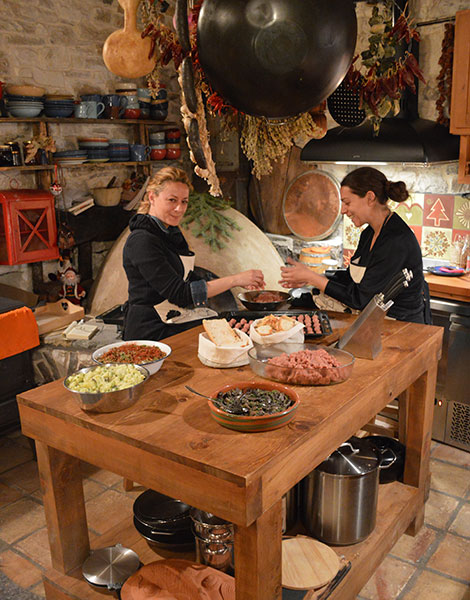
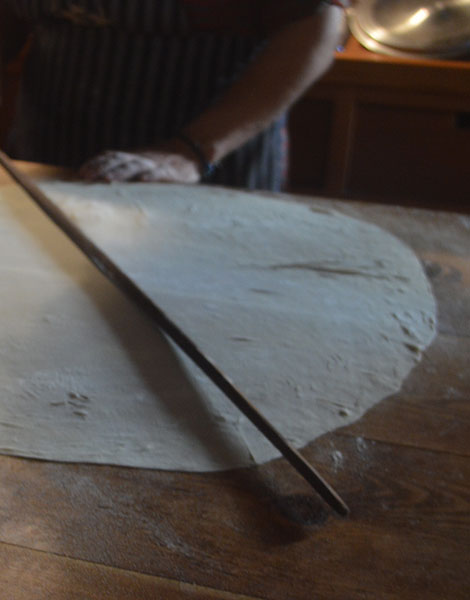
© Anemi Guesthouse
Forest-to-Table: Anemi guesthouse, Zagori
It’s best to bring your boots when you visit Anemi guesthouse. The villages of Zagori aren’t famous for their farmland, but that doesn’t stop the owners, Lila and Pavlos, from putting together mouthwatering meals and food-centered activities focused on local products. Much of what is served here is foraged in the wild.
Lila believes in minimizing food miles and, thankfully, the forest offers an abundance of wild fruit and berries. From early spring until autumn, there are also plenty of mushrooms to find, if you know where to look – which their guide does. Whatever cannot be found in or around the village is sourced from as nearby as possible. The olive oil, for example, comes from Preveza.
The indoor activities are equally educating. During cooking seminars, the freshly picked fruit (cherry plums, elderberries, apples, Cornelian cherries, and more) is turned into jams, the mushrooms are used to cook wonderful meals, and milk from the village is transformed into fresh cheese. Local specialties are made for dinner, and you are welcome to join in preparing them in the kitchen, which opens up into the common room. The meals often last for hours, as guests gather around the wood-fired oven. Of course, it’s all washed down with local wine, beer and tsipouro.
Info
While most guests stay for 3-4 days (from 80 euros/night), you are also welcome to visit for a cooking seminar of your choice (from 15 euros, by appointment) when there is room. The seminars are around two hours long, and can be given in English, Greek, Italian or Spanish.
Kato Pedina, Zagori, Tel (+30) 26530.720.03, anemi-zagori.gr
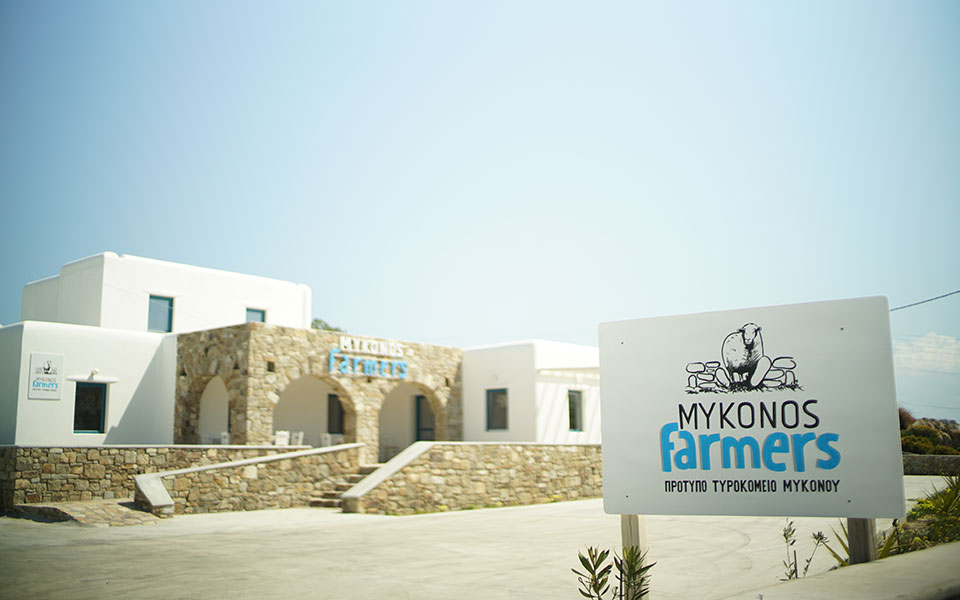
A Dream for Cheese Lovers: Mykonos Farmers
While it’s tempting to party away every day on Mykonos, it’s definitely worth spending one day discovering the island’s gastronomic scene, and although there might not be any scientifically proven cures for hangovers, a cheese-centered cooking class might take your mind off your headache.
On this island, even the most traditional things come in a contemporary package. Mykonos Farmers makes traditional cheeses using modern equipment and techniques, presenting them to visitors through tastings and guided tours through its workshops.
In the cheese-making classes, led by cheesemaker George, you’ll learn the ins and outs of making cheese naturally, without packaged starters, additives and chemicals, and how to source the best possible milk. You get to make cheese and to take recipes home with you so that you can continue learning on your own. However, most visitors choose the customizable cooking classes, hosted by George and Irini. Some dishes are set (such as cheese-filled ravioli and spinach pie), but you can also request to learn how to make your favorite Greek foods.
On Sundays, the cooking classes are paired with a food tour through Hora, led by George.
Info
The cooking courses (45-70 euros) and the food tour (from 70 euros) have to be booked two days in advance, with a minimum of four participants required for each event. If you don’t have time for a course, you can drop in at any time for a tour of the facilities (lasts from 45 minutes to an hour), complete with a cheese tasting (10 euros). The tours and classes are available in English and Greek.
Aghios Lazaros, Mykonos, tel (+30) 22890.239.70, mykonosfarmers.com
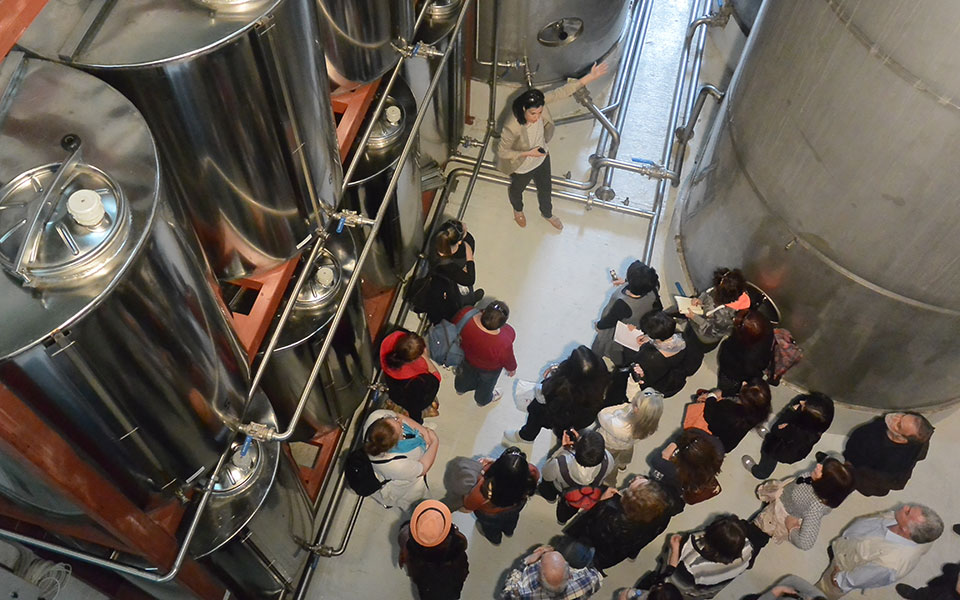
© Vassilakis Estate
Liquid gold for free: Vassilakis Estate, Mirabello, Crete
If you’ve ever dipped bread into a horiatiki (“village”) salad in Greece, you know what makes it stand out from the copycat dishes served all over the world under the name “Greek salad.” All the ingredients make a difference, but the most important is the local extra virgin olive oil (EVOO). At the Vassilakis Estate in Crete, you’ll learn why, for free, in just 45 minutes.
Arriving at the estate, visitors are warmly welcomed by a member of the Vassilakis family, and then led straight to the olive trees. Five varieties are represented, even though the estate only produces oil from one (Koroneiki). Next stop is the museum, with the family’s old hand-operated olive press, which dates all the way back to 1865 and was used until 1960.
After learning how they produced oil from olives back then, a tour of the new facilities gives insight into contemporary practices. The size of the 1,000-tonne steel tanks used for storing the oil is jaw-dropping. Finally, a video presentation of the harvest is followed by a tasting of the company’s five olive products (olives and four EVOOs), as well as a selection of other local delicacies.
Info
The estate is open to visitors every day, 9:00-19:00 from April to October, and 9:00-16:00 from November to March, and tours are given in English, Greek, German, French, Polish and Russian. Morning hours are less busy.
Neapoli, Lasithi, Crete, tel (+30) 28410.336.53, vassilakisestate.gr
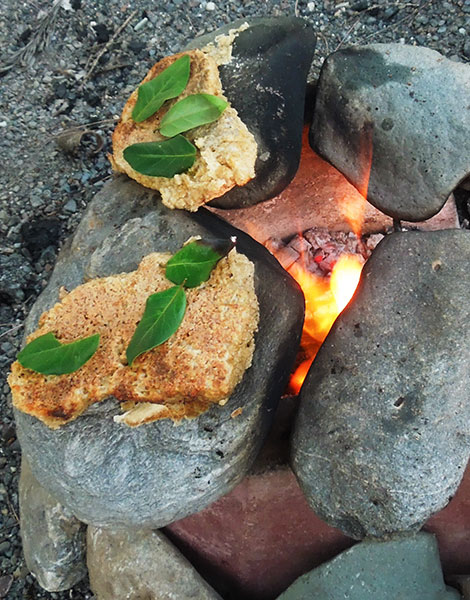
© Marianna Kavroulaki
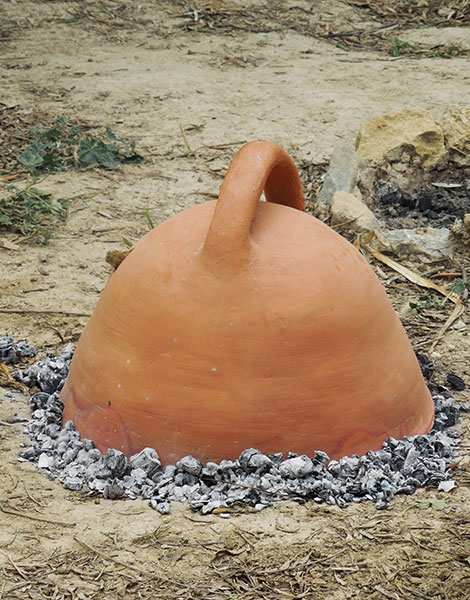
© Marianna Kavroulaki
Ancient Cooking: Seminars by Mariana Kavroulaki, Hania, Crete
Animals stuffed with other animals, and cheese made with fig sap; there’s written record of these and plenty of other dishes commonly eaten thousands of years ago. Many more clues to the cuisine of the ancient Greeks come in the form of finds such as cooking vessels and remains of actual food.
Today, you can cook and eat like the ancients at Mariana Kavroulaki’s Greek Culinary History & Cooking Adventures in Crete. At the seminars, which take place in an olive grove at Kavroulaki’s home, 5 km from Hania, she uses age-old techniques and replicas of ancient equipment to create the typical flavor-packed food enjoyed from the classical period to the late Byzantine era.
While the Greek cuisine today is often referred to as “Spartan” or “clean,” the food of the ancient Greeks was much more vibrant. Some of the dishes may be intimidating. Myma, for example, is a sweet- and-sour dish combining honey or raisins with blood, liver, cheese, onion, 17 different herbs and spices, and sour elements like vinegar.
“The ancient Greeks mixed sweet and savory flavors in ways we’re not used to today,” Kavroulaki explains. Each dish was comprised of many elements, and the result was food that tickled all the taste buds. Other dishes, like the bread and the cheese, are more similar to the staples we’re used to today.
Info
The seminars are customizable, though usually around 3-4 hours long, and cost from 70 euros/person. A minimum of eight participants is required.
Ano Daratsos, Hania, Crete, tel (+30) 690.755.2349, historyofgreekfood.weebly.com
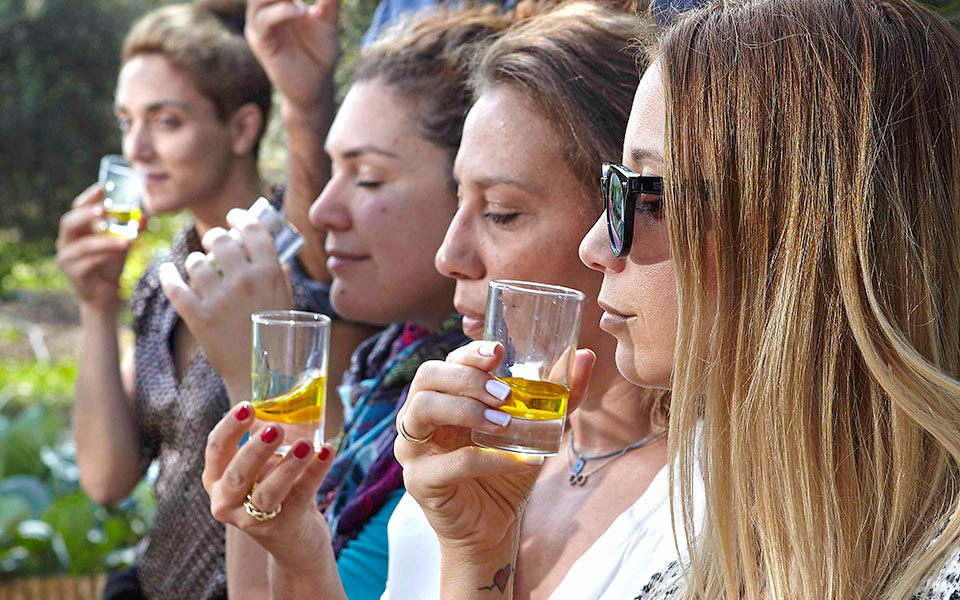
© The orchard in Vari
Family Farm Fun: The Orchard in Vari, near Athens
While the city of Athens, with its many restaurant options, is a fun melting pot of different gastronomic experiences, the lack of nature sometimes makes a country-style meal seem out of place. However, at To Perivoli sti Vari (the Orchard in Vari), 20 km from the city center (you can take the X95 Airport bus to Vari), the setting goes perfectly with the food served.
“Our hope is that we’ll be able to act like a gateway drug to healthier living,” says founder Anna Mordechai. The orchard is one of very few permaculture establishments in Greece. They’re aiming to “close the loop,” as she puts it, by making use of everything nature offers, and returning waste to the earth. The food served is cooked with their own herbs, eggs and vegetables, grass-fed meat and local products, and contains no additives. Quite surprisingly, this healthy food is a hit with children.
Kids also love the gardening workshops (English workshops by appointment, at 10 euros/person), and playing in the natural environment on the farm. Adults can join in tastings of olive oil, honey and wine, and visitors in the months of October through January can observe the production of olive oil in the orchard’s mill.
Info
The Orchard in Vari is open to visitors Wed-Sun from 10:00 until sunset.
15 Kyrgion, Vari, tel (+30) 210.896.3000, perivolivari.gr
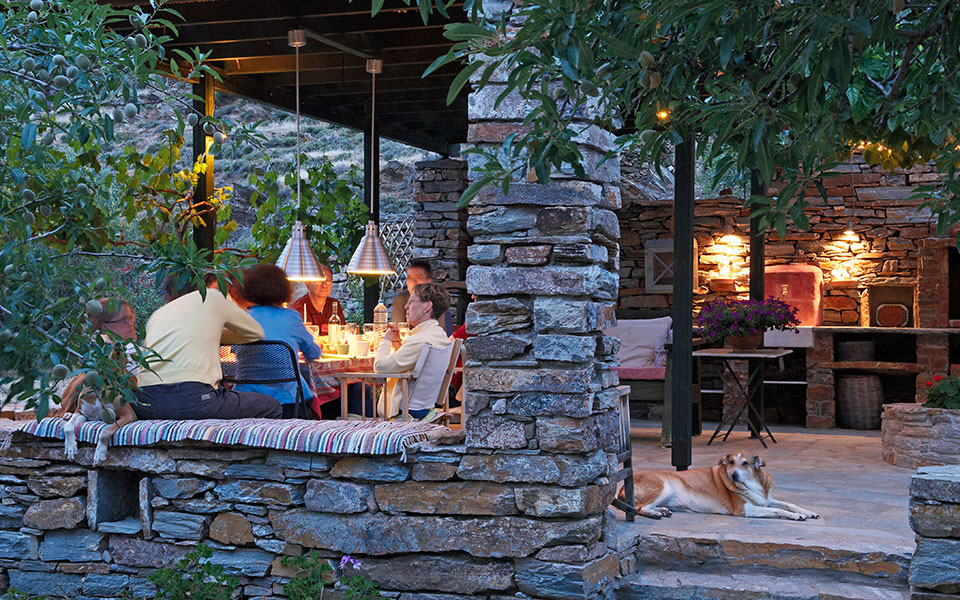
© Aglaia's Table
A Week of Food: Aglaia’s Table, Kea
For true foodies, every day on vacation is another chance to discover new flavors. For those who want more than a couple of days of experiences, cookbook author Aglaia Kremezi and her husband, Costas Moraitis, design all-in-one programs with a perfect balance of food, sightseeing and relaxing.
Located on the island of Kea, they host hands-on cooking classes and tastings in their home, and work with the locals to create exciting excursions.
During the recommended six day stay (1,600 euros/person), where you’ll sleep at a four-star hotel and get picked up for each day’s activities, you’ll learn to make everything from grilled fish wrapped in fig leaves, to your own filo dough, to desserts, but you’ll also enjoy guided walking tours through the surrounding villages and archaeological sites, picnics on the beach, trips to local artisans and tavernas, farming activities like harvesting olives in the fall, and having time to relax or explore on your own.
Info
Ioulis, Kea, tel (+30) 22880.219.17, (+30) 693.241.3205, aglaiakremezi.com
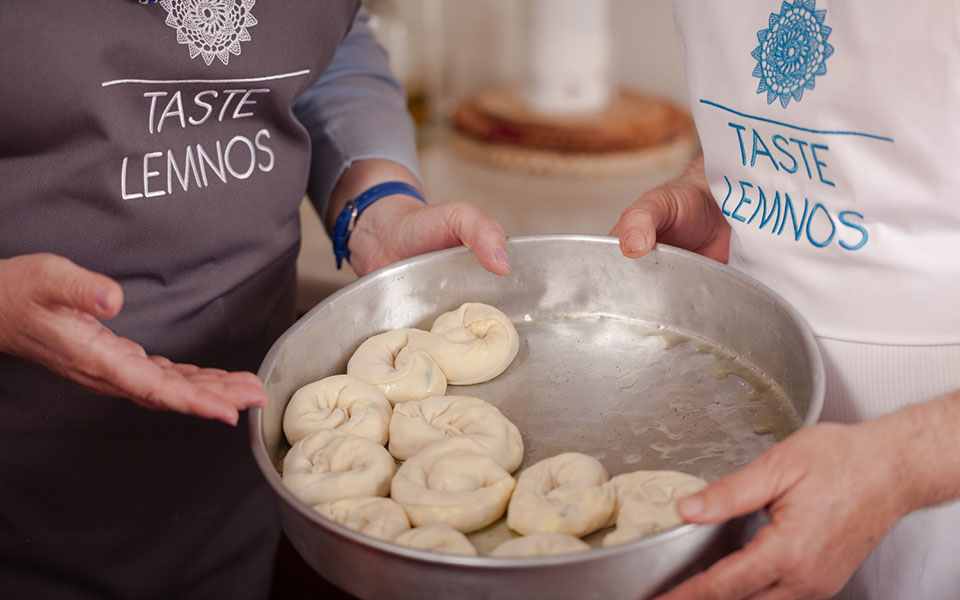
© Taste Lemnos
Traditional island flavors: Cooking with Mama Marika, Limnos
The flour of Limnos, made from durum wheat, lends unique flavor and color to the island’s baked goods. In the private kitchen of Marika Salamoussa, the local flour sits next to produce freshly picked from the vegetable patch. Open the fridge, and you’ll find more local products, like kalathaki cheese, named for the shape it gets from being molded in small baskets.
Through Taste Lemnos, run by her son Alexandros Alexandrou, Salamoussa hosts cooking classes for those interested in learning how to cook traditional Greek food, using locally sourced ingredients. Her home is situated in the largely tourist-free Moudros village, the second largest village on Limnos, and visitors can request pickup from their hotels in other parts of the island.
The group meets at Salamoussa’s at 9:00. Entering the kitchen, the yellowish flour and the cheese take center stage straight away, as you prepare to make the island’s famous twisted cheese pies. For the next three hours, you’ll gather fruit and herbs from the garden, and cook a feast of dishes such as goat and potatoes in the oven and gemista (vegetables stuffed with rice). The meal is devoured accompanied by local wine and tsipouro.
Info
The lessons are held in English and Greek, by appointment, and cost 35 euros/person (children: 29 euros). A minimum of two participants is required.
Iroon Park, Moudros, Limnos, tel (+30) 22540.710.42, tastelemnos.com

